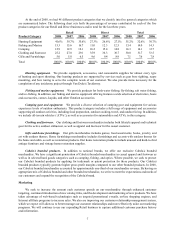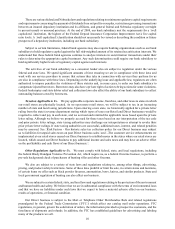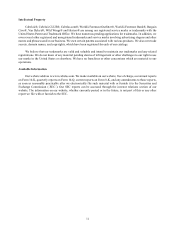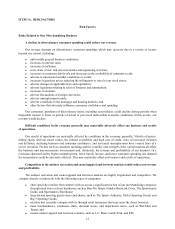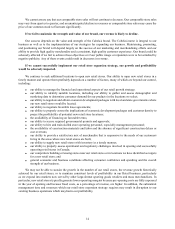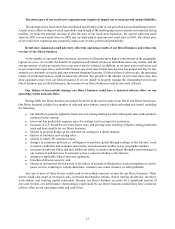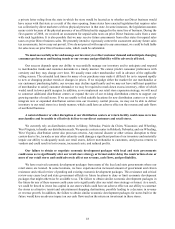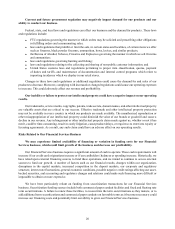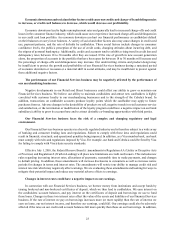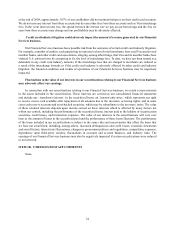Cabela's 2008 Annual Report Download - page 22
Download and view the complete annual report
Please find page 22 of the 2008 Cabela's annual report below. You can navigate through the pages in the report by either clicking on the pages listed below, or by using the keyword search tool below to find specific information within the annual report.17
In addition, trade restrictions, including increased tariffs or quotas, embargoes, safeguards, and customs
restrictions against apparel items, as well as United States or foreign labor strikes, work stoppages, or boycotts could
increase the cost or reduce the supply of merchandise available to us or may require us to modify our current business
practices, any of which could hurt our profitability.
Due to the seasonality of our business, our annual operating results would be adversely affected if our
revenue during the fourth quarter was substantially below expectations.
We experience seasonal fluctuations in our revenue and operating results. Historically, we have realized a
significant portion of our revenue and earnings for the year in the fourth quarter. In 2008, we generated 34.5% of our
revenue, and 64.7% of our net income, in the fourth quarter. We incur significant additional expenses in the fourth
quarter due to higher customer purchase volumes and increased staffing. If we miscalculate the demand for our
products generally or for our product mix during the fourth quarter, our revenue could decline, which would harm
our financial performance. In addition, abnormally warm weather conditions during the fourth quarter can reduce
sales of many of the products normally sold during this time period and inclement weather can reduce store traffic
or cause us to temporarily close stores causing a reduction in revenue. Because a substantial portion of our operating
income is derived from our fourth quarter revenue, a shortfall in expected fourth quarter revenue would cause our
annual operating results to suffer significantly.
If we lose key management or are unable to attract and retain the talent required for our business, our
operating results could suffer.
Our future success depends to a significant degree on the skills, experience, and efforts of our senior executive
management and merchandising teams. With the exception of our Chairman, Richard N. Cabela, and our Vice
Chairman, James W. Cabela, none of our senior management or directors has employment agreements other than
our Management Change of Control Severance Agreements. We do not carry key-man life insurance on any of our
executives or key management personnel. In addition, our corporate headquarters is located in a sparsely populated
rural area which may make it difficult to attract and retain qualified individuals for key management positions. The
loss of the services of any of these individuals or the inability to attract and retain qualified individuals for our key
management positions could cause our operating results to suffer.
Our business depends on our ability to meet our labor needs, and if we are unable to do so, our retail store
expansion strategy may be delayed and our revenue growth may suffer.
Our success depends on hiring, training, managing, and retaining quality managers, sales associates, and
employees in our retail stores and customer care centers. Our corporate headquarters, distribution centers, return
center, and some of our retail stores are located in sparsely populated rural areas. It may be difficult to attract and
retain qualified personnel, especially management and technical personnel, in these areas. Competition for qualified
management and technical employees could require us to pay higher wages or grant above market levels of stock
compensation to attract a sufficient number of employees. If we are unable to attract and retain qualified personnel as
needed, the implementation of our retail store expansion strategy may be delayed and our revenue growth may suffer.
Our historic sales tax collection policy for our Direct business may subject us to liabilities for unpaid
sales taxes on past Direct business sales.
Many states have attempted to require that out-of-state direct marketers, whose only contacts with the state
are solicitations and delivery to their residents of products purchased through the mail or the Internet, collect sales
taxes on the sale of these products. In addition, a private litigant, purportedly on behalf of various states, has initiated
litigation against several out-of-state direct marketers alleging that the failure to collect and remit sales tax violates
various state false claims laws. The U.S. Supreme Court has held that states, absent congressional legislation, may
not impose tax collection obligations on out-of-state direct marketers unless the out-of-state direct marketer has
nexus with the state. Nexus generally is created by the physical presence of the direct marketer, its agents, or its
property within the state. Our sales tax collection policy for our Direct business is to collect and remit sales tax in
states where our Direct business has established nexus. Prior to the opening of a retail store, we historically sought


